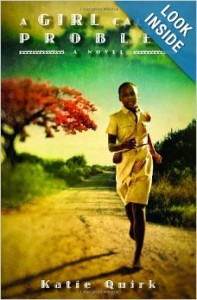 Dr. Bird’s Advice for Sad Poets is the kind of book I should like very much, It’s a “problem novel” (think ABC After-School special, for those of you old enough to know what that was) about a teenage boy who has been abused by his parents and who is dealing with clinical depression (or bipolar disorder or something similarly challenging). The main character, James, is engaging and sympathetic. He hugs trees to cheer himself up, and he imagines a pigeon analyst, Dr Bird, who advises him on his mental and family issues. (I could only picture Dr. Bird as Mo Willems’s Pigeon, with glasses.) James is a fan of the poetry of Walt Whitman, and he’s a budding poet himself.
Dr. Bird’s Advice for Sad Poets is the kind of book I should like very much, It’s a “problem novel” (think ABC After-School special, for those of you old enough to know what that was) about a teenage boy who has been abused by his parents and who is dealing with clinical depression (or bipolar disorder or something similarly challenging). The main character, James, is engaging and sympathetic. He hugs trees to cheer himself up, and he imagines a pigeon analyst, Dr Bird, who advises him on his mental and family issues. (I could only picture Dr. Bird as Mo Willems’s Pigeon, with glasses.) James is a fan of the poetry of Walt Whitman, and he’s a budding poet himself.
So, why did I only sorta, kinda like this book? I know one thing that bothered me: the implication that mental illness is caused by parental abuse or neglect. No, the book never said that James’s parents made him depressed and suicidal, but his sister is also depressed and angry and seeing a counselor. And a lot of James’s issues seem to be at least exacerbated by his parents, who by the way, are very one-dimensional, angry people. I understand that the book is written in first person from James’s point of view, and that he probably doesn’t see his parents as real people. For him they are “the Banshee” and “the Brute”. Still, the author could have used the plot and dialogue to tell us something about the parents that would make us see them as full, if not very likable, characters.
Or maybe I’m just coming at this book from a parent’s perspective, not that I’m terribly sympathetic with parents who beat and verbally abuse their children. Nevertheless, teens get depressed, and it often has nothing to do with their admittedly imperfect parents. (Do I sound defensive? Well, I do have family members who deal with depression.)
OK, so that said, I’ll tell you what I did like about this book. I liked Dr. Bird, the imaginary therapist, who actually gives sound advice to her “patient”. I liked the Walt Whitman quotations and allusions, even though I don’t generally care for Whitman, and I liked James’s self-awareness and intelligence. The narrative showed that people who are dealing with mental illness are still “normal” people. They’re smart; they write poetry; they hug trees; they have jobs; they go to school; they make sometimes good and sometimes bad choices.
I didn’t totally fall for Dr. Bird’s Advice for Sad Poets (oh, yeah, love the title) because of the parent angle, and it does include the obligatory crude language (briefly in comparison to other YA novels I’ve read lately). However, you might find it amazing, or at least enlightening.
Dr. Bird’s Advice for Sad Poets is a finalist for the Cybils Awards in the category of Young Adult Fiction.
